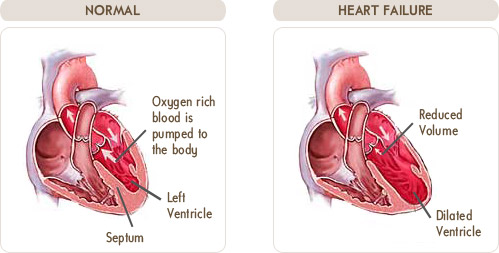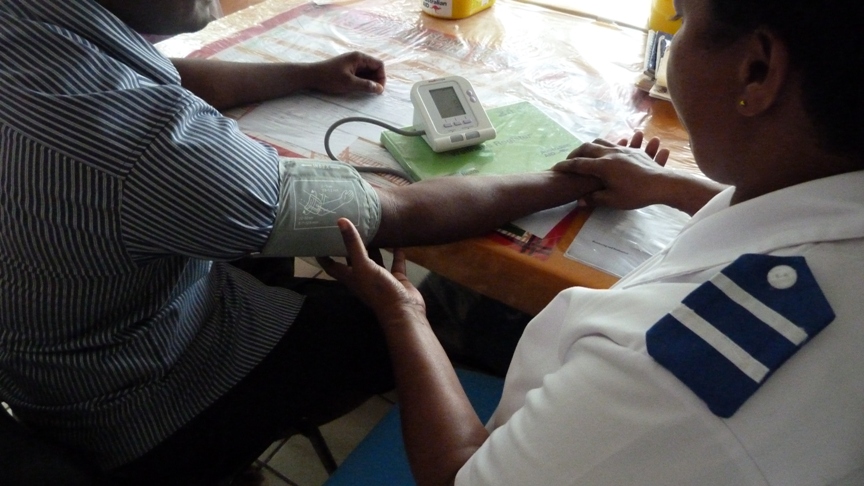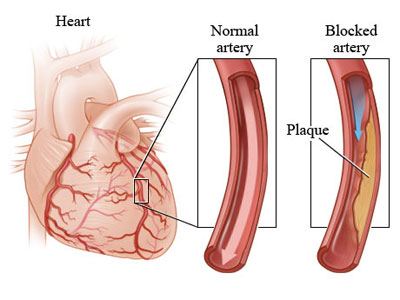What is Heart Disease?
Blood is pumped around your body by your heart through veins and arteries. It delivers oxygen and important nutrients to keep your body working. When there is something wrong with your heart or blood vessels, this is called heart (cardiovascular) disease.
Heart disease is the biggest killer in Fiji with over 1,000 cases reported each year.
What are the different types of Heart disease?
There are many different types of heart disease, some of the most common types in Fiji are;
- Congestive Heart Failure
- Hypertension
- Unstable Angina
- Ischaemic Heart disease (Coronary Heart disease)
Heart Failure
Congestive Heart Failure doesn’t mean the heart has stopped working but rather, it isn’t able to pump enough blood to meet the needs of the body. This may happen for different reasons; the heart muscle might be weaker that normal, there may be a defect in the heart preventing the blood flowing normally.
When the heart does not circulate blood properly, the kidneys receive less blood and so filter out less fluid into the urine. This extra fluid in circulation builds up in other areas in the body such as eyes, lungs and legs. This fluid is called “congestion” which is what gives this heart disease its name.
Source: www.terumoheart.com
Some common symptoms of heart failure include;
Shortness of breath – most commonly during activity, also when resting or sleeping which may wake you up. You may experience difficulty breathing when lying flat and so have to prop your upper body up to relieve the difficulty. You often wake up feeling tired or anxious and restless.
Coughing and wheezing – that may produce white or pinkish mucus with a hint of blood.
Excess fluid in the body – this can result in swelling in the feet, ankles, legs or abdomen. Your shoes may feel tighter or you noticeably gain weight.
Tiredness – feeling tired all the time and finding everyday activities hard, even shopping or walking feels difficult.
Lack of Appetite – you may not feel hungry, but often feel full or sick in your stomach
Confusion, not thinking properly – you may not feel yourself, confused or disorientated. Your friends or family may notice this before you do.
Fast heart rate – you may notice your heart beating faster, like it is racing or throbbing.
Hypertension
Hypertension is Fiji’s second most common heart disease, it is also known as high blood pressure. Blood pressure is the measure of the force of blood against your artery wall. Anyone can develop hypertension; it increases your risk of heart attack or stroke.
There are generally no warning signs or symptoms for high blood pressure, so it is important you get tested by your doctor or health professional, they will be able to measure your blood pressure.
Whilst blood pressure can go up and down throughout the day, if it remains high for a long period of time (around 3 months) then you have high blood pressure. See below for a chart that explains how your blood pressure is measured.
Image: Nurse takes patients blood pressure as part of Diabetes screening
There are many lifestyle factors that can put you at risk of hypertension.
- If you are overweight or obese
- Drinking too much or excessive amounts of alcohol
- Eating too much salt (Sodium) in your diet
- A Lack of enough physical activity (you should be doing 30-60 minutes of moderate physical activity every day)
You should eliminate the risk factors above. There is also blood pressure lowering medication that you can take, but only as directed by your doctor.
If you are at risk of high blood pressure or do have high blood pressure, you should have regular health checks, at least once a year. Speak to your health worker to learn more.
Ischaemic Heart Disease
Ischaemic Heart Disease (IHD) is also known as Coronary Heart Disease and causes heart attacks by restricting blood flow to the heart. IHD is caused by a build up of plaque along the inner walls of your heart (coronary artery), this plaque eventually thickens and hardens, obstructing the blood flow and causing a heart attack.
The signs and symptoms of IHD only become obvious once it is in an advanced state, which is why heart attacks may seem “sudden” or unexpected. This is because IHD can build up over a very long time, even decades, before symptoms are felt. Early symptoms include angina (chest pain), especially when exerted or having done exercise as well as decreased exercise tolerance (Stable IHD). Unstable IHD presents itself as chest pain or other symptoms and rapidly worsening angina.
Source: www.inrechopen.com
Angina
A common earlier symptom of IHD is Angina (chest pain) that usually occurs when exercising. You heart can’t get enough oxygen to work properly because the arteries that are carrying the blood to the heart get too narrow.
Symptoms of Angina include:
- A pain or tightness in your chest that may come and go
- Sudden Difficulty breathing
- Chest pain spreading to your jaw, teeth or earlobes
- Heaviness, tingling or aching in your shoulder or arm (usually on the left side).
- Pain between your shoulder blades
If you’ve had any of these symptoms, talk to your local doctor or nurse immediately.
Heart Attack
A heart attack can occur when the flow of blood to a section of your heart becomes blocked, preventing the blood from moving through your heart. If the flow is not restored quickly enough, that section of your heart muscle dies.
You may experience some of the following symptoms when you are having a heart attack. Be aware that you may also not feel any pain at all.
You may feel pain in your;
- Middle of your chest (can be mild to severe) – this is the most common symptom
- Jaw
- Neck
- Shoulder
You may also get other symptoms, such as:
- Sweating
- Feeling dizzy or faint
- Vomiting
- Shortness of breath.
If you think you or someone else may be having a heart attack, call an ambulance or go to hospital immediately. Early treatment can save your life.
Am I at risk of Heart Disease?
An unhealthy lifestyle puts you at much greater risk of heart disease. It is the number one killer in Fiji and the world.
Your risk of heart disease increases
- As you get older
- If you smoke
- Have high blood cholesterol
- Have Diabetes
- Have high blood pressure
How do I reduce the risk of Heart Disease
There are some very simple steps you can take to reduce your risk of heart disease. It all has to do with a healthy lifestyle. If you follow these steps you are also lowering your risk of many other diseases.
- Stop smoking
All types and levels of smoking is very bad for your heart. Smoking increases your blood pressure and heart rate and reduces oxygen in the blood.
If you quit smoking completely, your body can repair itself and within 5 years, your risk of heart disease can drop to that of a non-smoker.
- Reduce or cut out alcohol completely
If you do choose to drink, it is much better for your heart if you moderate the amount you drink and make sure you don’t drink too much.
For adult females and adult males over the age of 65, a maximum of one drink per day is a healthy amount.
For adult males under the age of 65, a maximum of two drinks per day is a healthy amount.
Any more than the above levels of Alcohol is a hazard to your health.
- Exercise for 30 minutes at least 5 days a week
Physical activity helps you control your weight and can reduce your chances of developing other conditions that may put a strain on your heart, such as high blood pressure, high cholesterol and diabetes.
You should aim to get at least 30 – 60 minutes of moderately intense physical activity on most days of the week. Sticking to this exercise routine will benefit your entire body, not just your heart. Even short bursts of 3 x 10 minute exercise sessions each day can benefit.
- Eat a ‘heart healthy’ diet
A diet rich in fruits, vegetables and whole grains can help protect your heart. Beans, other low-fat sources of protein and certain types of fish also can reduce your risk of heart disease.
Bad Fats
Limiting certain fats you eat also is important. There are different types of fat — saturated fats should be limited and trans fats should be kept out of your diet altogether.
Major sources of saturated fat include:
- Red meat
- Dairy products
- Coconut and palm oils
Sources of trans fat include:
- Deep-fried fast foods
- Bakery products – white breads
- Packaged snack foods
- Margarines
- Breakfast Crackers
Good Fats
Rather than the above types of fats, you should include more ‘healthy fats’ from natural foods such as avocado, nuts, fish and olive oil. Not only are they tasty, they also help your heart by reducing the bad cholesterol.
Fruits and Vegetables
You should up your daily fruit and vegetable intake to at least 2 servings of fruit and 3 servings of vegetables a day, but the more the merrier,10 servings a day would be even better!
Lower Salt Intake
There is salt hidden in lots of foods, especially packaged and processed foods, in fact about 75% of the salt we eat is from processed food such as tinned foods and tomato sauce. Reducing salt in your diet doesn’t have to be hard and by doing so, you can reduce your blood pressure which means you reduce your risk of heart disease and stroke.
Here are 4 easy ways to reduce your salt;
- Read the food labels carefully and choose the lower salt (Sodium) options
- Eat less foods that are high in salt – fatty meats, chips, processed foods
- Use natural herbs and spices to flavour your food instead of salt
- No more dipping food and meats in salt, you only need a small pinch of salt!
- Maintain a Healthy Weight
Being overweight, especially if you carry lots of weight around your middle, increases your risk of heart disease. Excess weight can lead to conditions that increase your chances of heart disease such as high blood pressure, high cholesterol and diabetes.
Even a small amount of weight loss can be of benefit and reduce your risk of these diseases.
- Get a Good Nights Sleep
A lack of good quality sleep can really harm your health. People who don’t get enough sleep have a higher risk of obesity, high blood pressure, heart attack, diabetes and depression.
If you feel tired and want to keep sleeping when you wake up in the mornings, you are probably not getting enough sleep.
Adults should aim for around 7 – 9 hours sleep each night, you should make sure you have a good routine in place and stick to it, make sure your room is dark and quiet to make sleeping easier. Getting enough sleep each night should be a priority.
A Healthy diet and daily exercise help you sleep better at night.
- Get your health screened regularly
Conditions such as high cholesterol and high blood pressure can really damage your heart, but there aren’t any symptoms so the only way you can know you have them is through testing. By getting regular health checks you can monitor your levels and stay in control. You can ask to be screened for Diabetes when you get a check up to ensure you get screened for;
- Blood Pressure
- Cholesterol levels
- Blood glucose levels
I want to know more about Heart Disease
You can learn more about the different types of heart disease and conditions as well as reducing your risk of heart disease on the New Zealand Heart Foundation website: www.heartfoundation.org.nz/
There you can also learn about;
Last Updated on 10 years by Publishing Team



